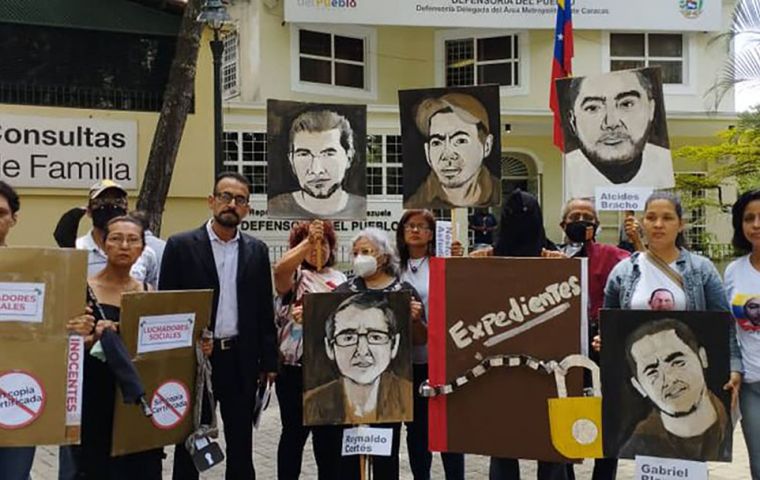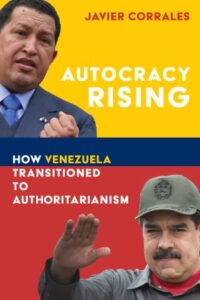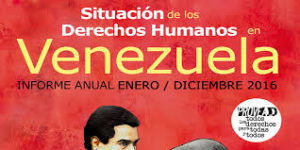
Merco Press
Venezuelan trade unionists and activists Reynaldo Cortés, Alfonzo Meléndez, Alcides Bracho, Néstor Astudillo, Gabriel Blanco, and Emilio Negrín were sentenced Tuesday to 16 years in jail for “conspiring” against President Nicolás Maduro, Merco Press reports:
The defendants were arrested between July 4 and 7, 2022, while staging protests in demand of wage increases and improvements in working conditions. The Coalition for Human Rights and Justice denounced that the labor leaders were all innocent and that the prosecution did not present sufficient “evidence” to sustain the accusation. The group also argued that the convictions were based on screenshots and messages written on Twitter.
 At a regional summit in late May, progressive activists gasped when Brazil’s President Lula claimed that human-rights violations and anti-democratic practices in Venezuela are just a “narrative construction,” notes Andrés Velasco, a former presidential candidate and finance minister of Chile, and Dean of the School of Public Policy at the London School of Economics and Political Science.
At a regional summit in late May, progressive activists gasped when Brazil’s President Lula claimed that human-rights violations and anti-democratic practices in Venezuela are just a “narrative construction,” notes Andrés Velasco, a former presidential candidate and finance minister of Chile, and Dean of the School of Public Policy at the London School of Economics and Political Science.
This in a country where, according to Human Rights Watch, “police and military units have killed and tortured with impunity in low-income communities,” and “authorities harass and persecute journalists, human-rights defenders, and civil society organizations,” he writes for Project Syndicate.
 U.S. Senator Bob Menendez (D-N.J.), Chairman of the Senate Foreign Relations Committee, this week announced he will introduce the Venezuela Emergency Relief, Democracy Assistance, and Development (VERDAD) Expansion Act after the August recess. The comprehensive legislation – which is an extensive legislative update to the VERDAD Act of 2019 – aims to ensure progress in negotiations to restore democracy in Venezuela, address the country’s complex humanitarian crisis, and advance accountability for the Maduro regime’s gross violations of human rights and criminal activities.
U.S. Senator Bob Menendez (D-N.J.), Chairman of the Senate Foreign Relations Committee, this week announced he will introduce the Venezuela Emergency Relief, Democracy Assistance, and Development (VERDAD) Expansion Act after the August recess. The comprehensive legislation – which is an extensive legislative update to the VERDAD Act of 2019 – aims to ensure progress in negotiations to restore democracy in Venezuela, address the country’s complex humanitarian crisis, and advance accountability for the Maduro regime’s gross violations of human rights and criminal activities.
Wearing headsets and sensors, viewers encounter such grim scenes on a virtual “visit” to one of Venezuela’s most notorious prisons, El Helicoide, in Caracas. The VR event Helicoide Reality*, featuring the testimony of 30 survivors of torture by Venezuela’s intelligence services, has been presented in 17 countries, Agence France Presse reports:
Among its viewers is Piotr Hofmanski, president of the International Criminal Court, which is investigating possible crimes against humanity committed under the government of President Nicolas Maduro. “We are looking for decision-makers to promote the closure of torture centers. We want El Helicoide to be closed,” said Victor Navarro, director of the NGO that developed the project, Voces de la Memoria (Voices of Memory).
 At one point, the virtual visitor is surrounded by cockroaches, and gradually shrinks until he reaches the size of the insect — an idea born from prisoner interviews. “(When you are detained) you are given the impression of being a cockroach,” says Navarro. Torture, he says, is dehumanizing that way, AFP adds:
At one point, the virtual visitor is surrounded by cockroaches, and gradually shrinks until he reaches the size of the insect — an idea born from prisoner interviews. “(When you are detained) you are given the impression of being a cockroach,” says Navarro. Torture, he says, is dehumanizing that way, AFP adds:
The experiences in Helicoide Reality match testimonies given to the ICC: Electric shocks to the testicles or suffocation with plastic bags are reported to be common at the prison, while many women report rape. The memories are painful — and are also still being made, Navarro points out. “The hardest thing is that in Venezuela, the torture continues.”
On Monday, August 7, 2023, from 11 a.m. to 12 p.m. (ET), the Wilson Center hosts a conversation with opposition candidate Henrique Capriles about about Venezuela’s election and the changing strategies of the democratic opposition. RSVP
*Supported by the National Endowment for Democracy (NED).*
At a regional summit in late May, progressive activists gasped when Lula claimed that human-rights violations and anti-democratic practices in #Venezuela are just a “narrative construction,” @AndresVelasco writes for @ProSyn https://t.co/tWkGBB2IDI
— Democracy Digest (@demdigest) August 2, 2023







